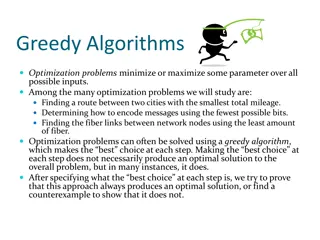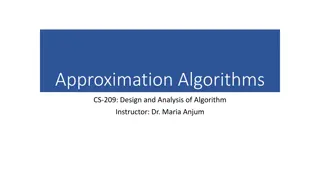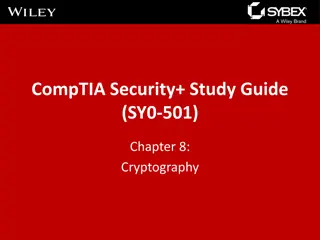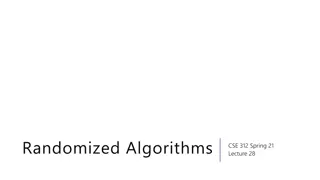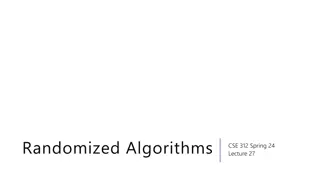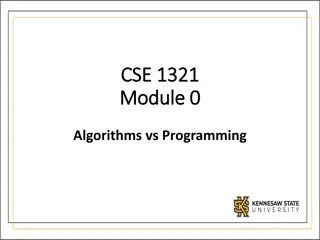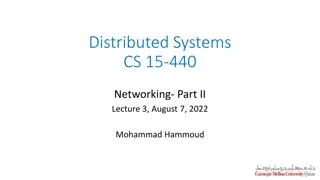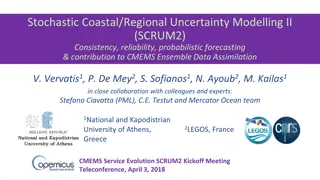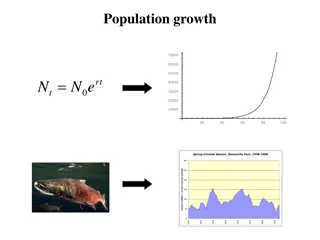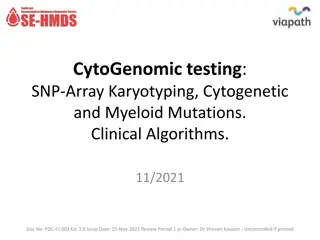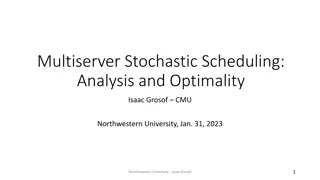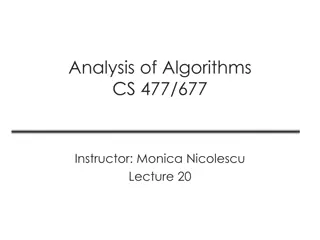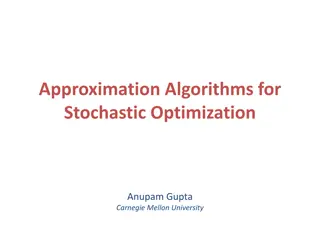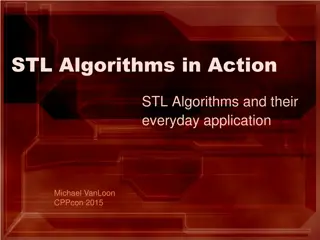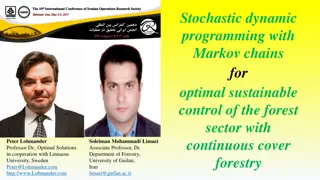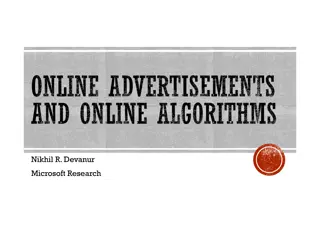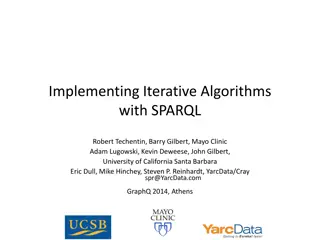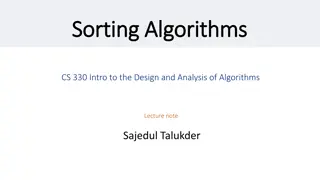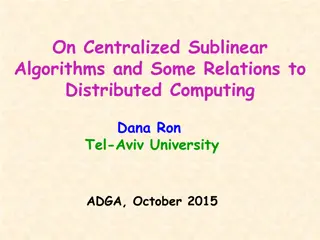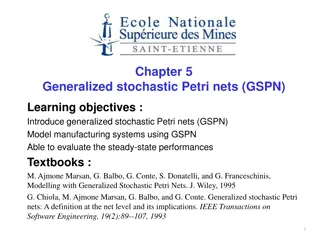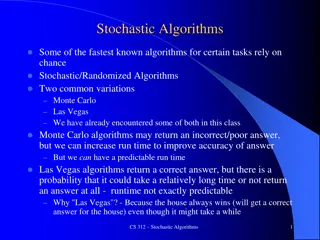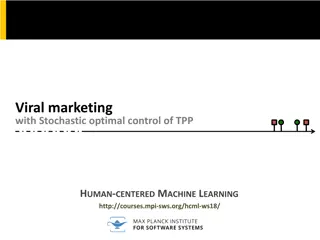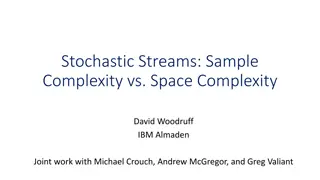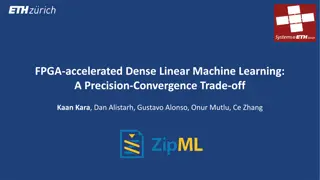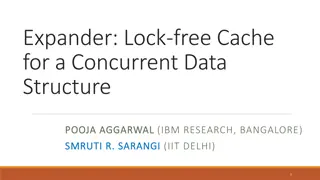Understanding Algorithms and Programming Fundamentals
Learn about algorithms, programming, and abstraction in computing. Explore the definition and properties of algorithms, the relationship between algorithms and programming, and the concept of abstraction. Discover how algorithms are like recipes and how abstraction simplifies complex tasks in comput
1 views • 17 slides
Stochastic Storm Transposition in HEC-HMS: Modern Techniques and Applications
Explore the innovative methods and practical applications of Stochastic Storm Transposition (SST) in the context of HEC-HMS. Delve into the history, fundamentals, simulation procedures, and benefits of using SST for watershed-averaged precipitation frequency analysis. Learn about the non-parametric
3 views • 41 slides
Greedy Algorithms in Optimization Problems
Greedy algorithms are efficient approaches for solving optimization problems by making the best choice at each step. This method is applied in various scenarios such as finding optimal routes, encoding messages, and minimizing resource usage. One example is the Greedy Change-Making Algorithm for mak
0 views • 12 slides
Near-Optimal Quantum Algorithms for String Problems - Summary and Insights
Near-Optimal Quantum Algorithms for String Problems by Ce Jin and Shyan Akmal presents groundbreaking research on string problem solutions using quantum algorithms. The study delves into various key topics such as Combinatorial Pattern Matching, Basic String Problems, Quantum Black-box Model, and mo
0 views • 25 slides
Understanding Approximation Algorithms: Types, Terminology, and Performance Ratios
Approximation algorithms aim to find near-optimal solutions for optimization problems, with the performance ratio indicating how close the algorithm's solution is to the optimal solution. The terminology used in approximation algorithms includes P (optimization problem), C (approximation algorithm),
2 views • 10 slides
Overview of Cryptography Techniques and Algorithms
Exploring the diverse realm of cryptography, this chapter delves into both nonmathematical and mathematical encryption methods. It covers substitution and transposition ciphers, steganography, hybrid systems, hashing, symmetric algorithms like DES and AES, as well as asymmetric algorithms utilizing
7 views • 21 slides
Combining Graph Algorithms with Data Structures and Algorithms in CSE 373 by Kasey Champion
In this lecture, Kasey Champion covers a wide range of topics including graph algorithms, data structures, coding projects, and important midterm topics for CSE 373. The lecture emphasizes understanding ADTs, data structures, asymptotic analysis, sorting algorithms, memory management, P vs. NP, heap
0 views • 38 slides
Panel Stochastic Frontier Models with Endogeneity in Stata
Introducing xtsfkk, a new Stata command for fitting panel stochastic frontier models with endogeneity, offering better control for endogenous variables in the frontier and/or the inefficiency term in longitudinal settings compared to standard estimators. Learn about the significance of stochastic fr
0 views • 13 slides
Generalization of Empirical Risk Minimization in Stochastic Convex Optimization by Vitaly Feldman
This study delves into the generalization of Empirical Risk Minimization (ERM) in stochastic convex optimization, focusing on minimizing true objective functions while considering generalization errors. It explores the application of ERM in machine learning and statistics, particularly in supervised
0 views • 11 slides
Understanding Randomized Algorithms: Types and Examples
Explore the world of randomized algorithms through types like Las Vegas and Monte Carlo, with a focus on classic examples such as Quick Sort. Learn how randomness plays a crucial role in computation and discover the principles behind these algorithms. Dive into the applications of randomized algorit
0 views • 22 slides
Understanding Randomized Algorithms: A Deep Dive into Las Vegas and Monte Carlo Algorithms
Randomized algorithms incorporate randomness into computations, with Las Vegas algorithms always providing the correct answer but varying in time, while Monte Carlo algorithms occasionally give wrong answers. Quick Sort is a classic Las Vegas algorithm that involves pivoting elements for sorting. Ch
4 views • 21 slides
Understanding Algorithms and Programming: A Visual Introduction
Explore the fundamental concepts of algorithms and programming through visual representations and practical examples. Learn about algorithmic thinking, abstraction, recipe-like algorithms, and the importance of logical steps in accomplishing tasks. Discover how algorithms encapsulate data and instru
1 views • 17 slides
Distributed Algorithms for Leader Election in Anonymous Systems
Distributed algorithms play a crucial role in leader election within anonymous systems where nodes lack unique identifiers. The content discusses the challenges and impossibility results of deterministic leader election in such systems. It explains synchronous and asynchronous distributed algorithms
2 views • 11 slides
Understanding Networking Principles and Routing Algorithms in Distributed Systems
Delve into the intricacies of networking principles and routing algorithms in distributed systems. Explore the four layers studied, including the network layer that handles routing. Discover the role of routers in forwarding packets between networks and the challenges of designing routing algorithms
1 views • 23 slides
Mathematical Analysis of Algorithms in CMPE371 - Fall 2023-2024
Explore the mathematical analysis of algorithms in CMPE371 for Fall 2023-2024, focusing on non-recursive and recursive algorithms. Learn how to analyze non-recursive algorithms by deciding on input size parameters, identifying basic operations, and simplifying summations. Dive into recursive algorit
1 views • 31 slides
Stochastic Coastal Regional Uncertainty Modelling II (SCRUM2) Overview
SCRUM2 project aims to enhance CMEMS through regional/coastal ocean-biogeochemical uncertainty modelling, ensemble consistency verification, probabilistic forecasting, and data assimilation. The research team plans to contribute significant advancements in ensemble techniques and reliability assessm
0 views • 28 slides
Understanding Population Growth Models and Stochastic Effects
Explore the simplest model of population growth and the assumptions it relies on. Delve into the challenges of real-world scenarios, such as stochastic effects caused by demographic and environmental variations in birth and death rates. Learn how these factors impact predictions and models.
0 views • 35 slides
Pseudodeterministic Algorithms and Their Application in Search Problems
Pseudodeterministic algorithms provide a unique approach to the search problem associated with binary relations, offering an error reduction technique while sacrificing the ability to approximate the average value of a function. By introducing m-pseudodeterministic and pseudo-pseudodeterministic alg
1 views • 6 slides
Comprehensive Algorithms for Cytogenomic Testing in Hematologic Malignancies
This document outlines clinical algorithms for the genetic evaluation of chronic lymphocytic leukemia (CLL), myelodysplastic syndromes (MDS), aplastic anemia, and idiopathic acquired aplastic anemia. It provides detailed protocols for genetic testing, including SNP array karyotyping, cytogenetic and
0 views • 8 slides
Multiserver Stochastic Scheduling Analysis
This presentation delves into the analysis and optimality of multiserver stochastic scheduling, focusing on the theory of large-scale computing systems, queueing theory, and prior work on single-server and multiserver scheduling. It explores optimizing response time and resource efficiency in modern
0 views • 38 slides
Understanding Greedy Algorithms in Algorithm Analysis
Greedy algorithms are a simpler approach compared to dynamic programming, focusing on making locally optimal choices in order to achieve a globally optimal solution. While not always yielding the best solution, greedy algorithms can provide optimal solutions for problems with specific characteristic
1 views • 23 slides
Approximation Algorithms for Stochastic Optimization: An Overview
This piece discusses approximation algorithms for stochastic optimization problems, focusing on modeling uncertainty in inputs, adapting to stochastic predictions, and exploring different optimization themes. It covers topics such as weakening the adversary in online stochastic optimization, two-sta
0 views • 33 slides
Understanding STL Algorithms: A Practical Guide
Explore the world of STL algorithms through an insightful discussion on the definition of algorithms, the advantages of using STL algorithms over raw loops, and the different classes of STL algorithms available. Discover how these pre-built libraries can enhance your programming efficiency and code
1 views • 99 slides
Exploring the Role of Algorithms in Game Design
Delve into the world of algorithms in game design, from understanding the fundamental concept of algorithms to their pervasive presence in various aspects of gaming, such as military simulations, medical simulations, and gameplay mechanics. Explore how algorithms shape experiences in different types
0 views • 10 slides
Evolutionary Computation and Genetic Algorithms Overview
Explore the world of evolutionary computation and genetic algorithms through a presentation outlining the concepts of genetic algorithms, parallel genetic algorithms, genetic programming, evolution strategies, classifier systems, and evolution programming. Delve into scenarios in the forest where gi
0 views • 51 slides
Optimal Sustainable Control of Forest Sector with Stochastic Dynamic Programming and Markov Chains
Stochastic dynamic programming with Markov chains is used for optimal control of the forest sector, focusing on continuous cover forestry. This approach optimizes forest industry production, harvest levels, and logistic solutions based on market conditions. The method involves solving quadratic prog
0 views • 27 slides
Integrating Stochastic Weather Generator with Climate Change Projections for Water Resource Analysis
Exploring the use of a stochastic weather generator combined with downscaled General Circulation Models for climate change analysis in the California Department of Water Resources. The presentation outlines the motivation, weather-regime based generator description, scenario generation, and a case s
0 views • 20 slides
Online Advertising and Algorithms: Insights and Simplifications
Explore the world of online advertisements and algorithms through insightful discussions on online advertising, modern developments in online algorithms, and practical optimization strategies like budgeted allocation. Delve into topics such as decision-making under uncertainty, accessing algorithms,
1 views • 22 slides
Implementing Iterative Algorithms with SPARQL
This comprehensive guide explores the implementation of iterative algorithms with SPARQL, focusing on YarcData/Cray's approach to using these algorithms. It covers YarcData's interest in graphs, the Urika appliance, iterative algorithms in machine learning, implementation approach, and algorithms im
1 views • 12 slides
Overview of Sorting Algorithms and Quadratic Sorting - CS 330 Lecture Notes
Sorting algorithms play a crucial role in computer science and computing tasks, consuming a significant portion of computing power. Various algorithms such as Bubble Sort, Selection Sort, and Insertion Sort are discussed for sorting a list of values efficiently. Quadratic sorting algorithms like Sel
0 views • 30 slides
Understanding Sublinear Algorithms and Graph Parameters in Centralized and Distributed Computing
Centralized sublinear algorithms and their relation to distributed computing are explored, emphasizing the efficiency of algorithms in processing large inputs in sublinear time. Examples of sublinear algorithms for various objects are provided, along with the computation and approximation of graph p
1 views • 34 slides
CS260 Parallel Algorithms: Theory and Practice Review
This review covers essential topics from the CS260 Parallel Algorithms course by Yihan Sun, focusing on key concepts such as scheduler programs, cost models, reduce and scan techniques, PRAM models, atomic primitives, small algorithms, the master theorem, and sorting algorithms like Quicksort and Me
0 views • 25 slides
Understanding Stochastic Differential Equations and Numerical Integration
Explore the concepts of Brownian motion, integration of stochastic differential equations, and derivations by Einstein and Langevin. Learn about the assumptions, forces, and numerical integration methods in the context of stochastic processes. Discover the key results and equations that characterize
0 views • 6 slides
Introduction to Generalized Stochastic Petri Nets (GSPN) in Manufacturing Systems
Explore Generalized Stochastic Petri Nets (GSPN) to model manufacturing systems and evaluate steady-state performances. Learn about stochastic Petri nets, inhibitors, priorities, and their applications through examples. Delve into models of unreliable machines, productions systems with priorities, a
0 views • 44 slides
Exploring Stochastic Algorithms: Monte Carlo and Las Vegas Variations
Stochastic algorithms, including Monte Carlo and Las Vegas variations, leverage randomness to tackle complex tasks efficiently. While Monte Carlo algorithms prioritize speed with some margin of error, Las Vegas algorithms guarantee accuracy but with variable runtime. They play a vital role in primal
0 views • 13 slides
Optimal Early Drought Detection Using Stochastic Process
Explore an optimal stopping approach for early drought detection, focusing on setting trigger levels based on precipitation measures. The goal is to determine the best time to send humanitarian aid by maximizing expected rewards and minimizing expected costs through suitable gain/risk functions. Tas
0 views • 4 slides
Optimizing User Behavior in Viral Marketing Using Stochastic Control
Explore the world of viral marketing and user behavior optimization through stochastic optimal control in the realm of human-centered machine learning. Discover strategies to maximize user activity in social networks by steering behaviors and understanding endogenous and exogenous events. Dive into
0 views • 15 slides
Understanding Tradeoff between Sample and Space Complexity in Stochastic Streams
Explore the relationship between sample and space complexity in stochastic streams to estimate distribution properties and solve various problems. The research delves into the tradeoff between the number of samples required to solve a problem and the space needed for the algorithm, covering topics s
0 views • 23 slides
Efficient Training of Dense Linear Models on FPGA with Low-Precision Data
Training dense linear models on FPGA with low-precision data offers increased hardware efficiency while maintaining statistical efficiency. This approach leverages stochastic rounding and multivariate trade-offs to optimize performance in machine learning tasks, particularly using Stochastic Gradien
0 views • 26 slides
Understanding Lock-Free and Wait-Free Algorithms in Concurrent Data Structures
Illustration of lock-free and wait-free algorithms compared to blocking algorithms, with insights on concurrent object execution, blocking vs. non-blocking algorithms, definitions, comparisons between locks, lock-free, and wait-free approaches, and explanations on making algorithms wait-free. Exampl
0 views • 23 slides


